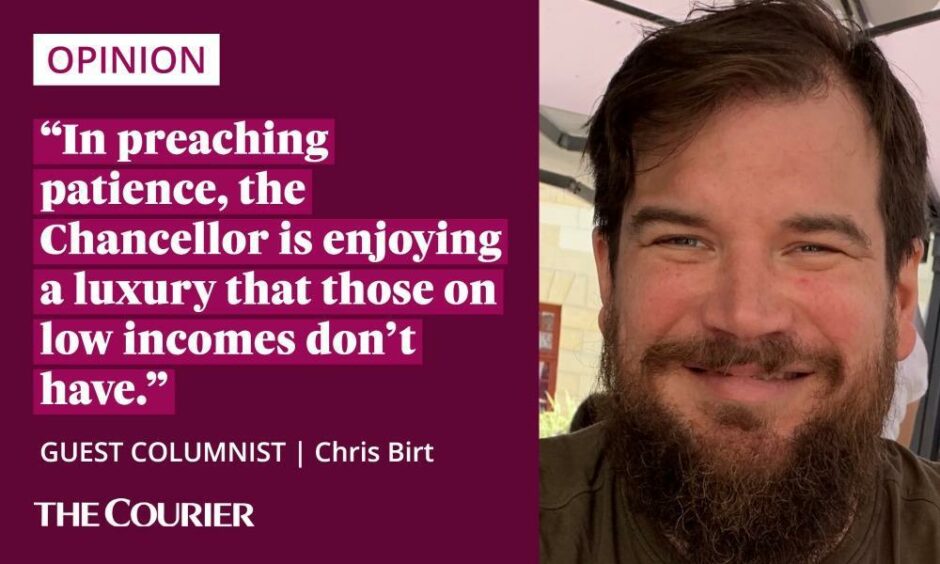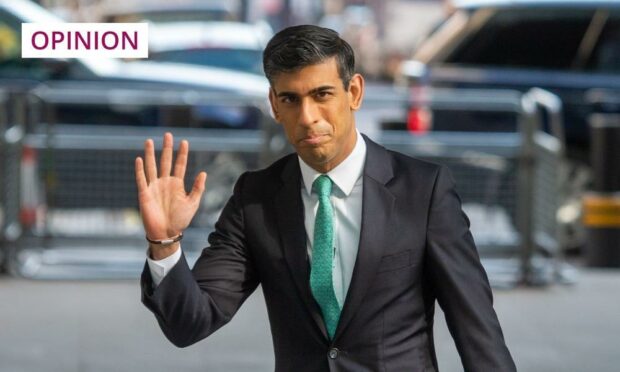So the Chancellor says he would be ‘silly’ to act now on the cost of living.
Rishi Sunak made the comment during a recent online Q&A with Mumsnet, adding that he would prefer to wait until the impact of the next energy price cap rise plays out in the autumn.
Does he not realise how grossly disconnected this language is from the struggles that families across Scotland and the UK are facing today?
Trussell Trust figures show foodbank use is already increasing towards levels seen during the height of the pandemic.
There are countless stories of families huddled under blankets for warmth, parents skipping meals so their children can eat and people saving money by not washing.
The situation is so dire that Energy Action Scotland recently told the Scottish Parliament lives may be at risk.

At its core, the rise in the cost of living has been turned into a crisis by a decade of shrinking incomes for those with the least across the UK.
It is battering households across the country when it should be being managed in the grand offices of Whitehall.
And it is government inaction that is starving people of the basics that we all need to get by.
Government has tools – why not use them?
No one would argue that the government can stop every bad thing from happening in our lives.
I’m thinking about big societal challenges like pandemics or inflation, as well as personal crises such as bereavement or job loss.
But neither should these events spell economic disaster for the poorest people in our communities.
📣 Today, we’re sharing the grim news that the food banks in our network gave out 2.1 million food parcels to people facing hardship between April 2021 and March 2022.
830,000 of these were given to children.
This is shocking. ⬇️ pic.twitter.com/Y8HZj7OKJn
— The Trussell Trust (@TrussellTrust) April 27, 2022
Governments have the tools and the powers to protect peoples’ incomes so they can, at the very least, eat and stay warm when these events happen.
But those tools are no use if they do not use them.
In preaching patience, the Chancellor is enjoying a luxury that those on low incomes don’t have.
And this approach risks damaging children’s futures and adults’ physical and mental health.
The silly thing is Rishi Sunak could turn to the benefits system
What makes it worse are the genuinely silly ideas that the UK government is reportedly batting around.
Fripperies such as reducing the frequency of MOTs or reducing the quality of childcare are the cherry on the custard pie of proposals coming out of a Cabinet tasked with coming up with solutions that don’t require any money to be spent.
But luckily for the Chancellor, there is a tool available to help people with the cost of living.
It’s called the benefits system.
While not perfect by any stretch, it is a system designed to deliver cash to people who really need it at short notice.
And the fact that the Chancellor refuses to use it, at the very time that people need it the most, is truly shocking.
Urgent action now – then change to prevent future crises
Just over two years ago in the frightening early days of the Covid pandemic, the Chancellor saw the crisis facing our country and made the bold and compassionate choice to raise universal credit and introduce the furlough scheme.
He knew he had to act.
Yet the crisis facing families on low incomes today is just as frightening.
And the necessity for action is just as obvious.
Set a timer for how long it takes for there to be a mealy mouthed apology for this.
The Chancellor needs to go and speak to more people in communities and the services that support them and he’ll see that his “silly” comment is deeply offensive. https://t.co/4Tno43P904
— Chris Birt (@cdbirt) April 28, 2022
The Chancellor needs to rally behind families across the country and plug the gaping holes in their budgets now.
And then all of us, including the UK and Scottish Governments, need to do the hard work to ensure crises such as these are a thing of the past.
Poverty scars lives and wider society.
We are a wealthy country. And we should all expect the right to a good standard of living, underpinned by community, self-worth and the chance to seize opportunities.
A Scotland, or a UK, where so many people live a gas bill away from a foodbank cannot be a place anyone wants to see.
Our governments have the power to change that and it’s silly to suggest anything else.
Chris Birt is Associate Director for Scotland at the Joseph Rowntree Foundation.











Conversation